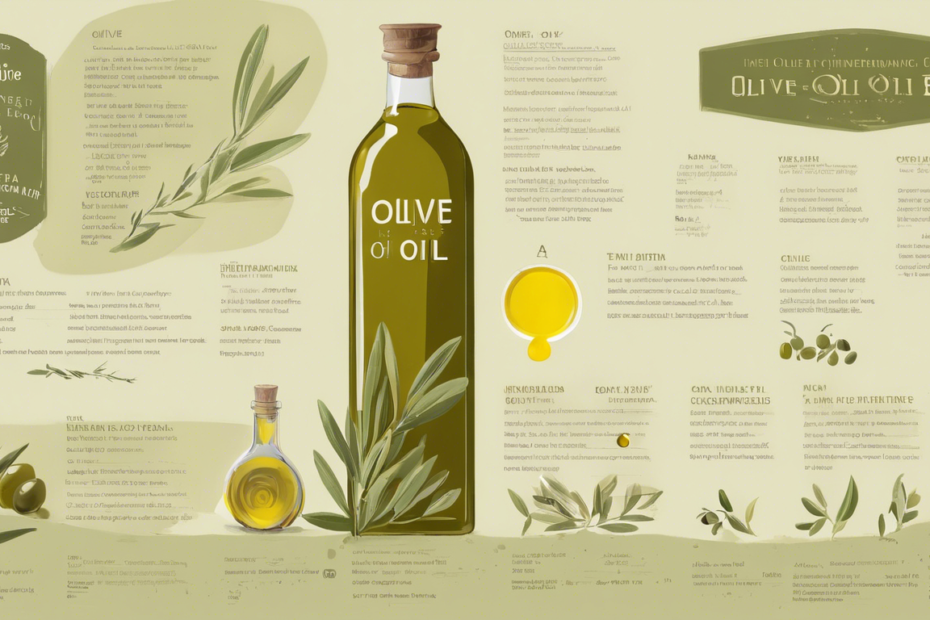If you’ve ever found yourself staring at the olive oil section of the grocery store, wondering what the fuss is all about, you’re not alone.
The world of olive oil can be a bit confusing, especially when it comes to differentiating between regular olive oil and its higher-end counterpart, extra virgin olive oil.
In this comprehensive guide, we’ll break down what each type of oil is, highlight the key differences, and help you choose the best one for your cooking and taste preferences.
Let’s dive into the rich and flavorful world of olive oil!
Key Takeaways
- Olive oil is a general term that encompasses various grades, while extra virgin olive oil is the highest quality.
- Extra virgin olive oil is produced from the first cold pressing of olives, preserving more flavor and nutrients.
- Olive oil typically undergoes processing that can dilute its flavor and health benefits.
- Understanding the acidity level is key, as extra virgin olive oil has a lower acidity than regular olive oil.
- Choosing the right olive oil depends on your cooking needs and health preferences.
What is Olive Oil?
So, what is olive oil?
Essentially, it’s a liquid fat that’s harvested from the fruit of the olive tree, primarily found in the Mediterranean region.
But when you hear the term extra virgin olive oil, that’s where things get a bit fancier!
Extra virgin olive oil (EVOO) is made from pure, cold-pressed olives and boasts the highest quality, ensuring it’s packed with flavor and health benefits.
Now, when we talk about the differences between olive oil and extra virgin olive oil, it’s mainly about the processing methods and the taste.
Regular olive oil is often refined, meaning it can lose some of those natural flavors and nutrition in the process, making it a bit blander.
On the flip side, extra virgin olive oil retains more of the natural goodness from the olives, often featuring a vibrant taste profile that can range from fruity to peppery.
So, if you’re looking to elevate your cooking or salad dressings, going for extra virgin olive oil is definitely the way to go!
What is Extra Virgin Olive Oil?
So, what is olive oil?
It’s a delicious oil made from pressing olives, and it’s a staple in many kitchens for cooking, dressing salads, or drizzling over dishes.
Now, when we talk about extra virgin olive oil (EVOO), we’re diving deeper into the world of quality.
Extra virgin is the highest grade of olive oil, made from the first cold pressing of olives with no heat or chemicals involved.
This means it retains the most nutrients and flavor, often boasting a rich, fruity taste and a higher smoke point, perfect for both frying and dressing.
The key differences between regular olive oil and extra virgin olive oil lie in their production process, acidity level, and flavor profile.
While regular olive oil might be a blend of refined and virgin oils and have a milder taste, extra virgin olive oil is all about purity and flavor dominance.
So, when you’re pondering ‘what is the difference between olive oil and extra virgin olive oil?’ remember that it’s all about quality, taste, and health benefits.
‘The best olive oil is that which is made from fresh olives, not from rotten or bad olives.’ — Unknown
Key Differences Between Olive Oil and Extra Virgin Olive Oil
When you’re staring at the olive oil section in the grocery store, you might wonder, ‘What is the difference between olive oil and extra virgin olive oil?’ Well, it’s pretty straightforward!
Extra virgin olive oil (EVOO) comes from the first cold pressing of olives and is made from high-quality olives, boasting low acidity and no chemical processing.
This results in a rich flavor and vibrant color, making it perfect for drizzling over salads or finishing dishes.
On the other hand, regular olive oil is often a blend of refined and unrefined oils, making it lighter in flavor and sometimes less healthy due to the refining process.
Plus, the smoke point for regular olive oil is higher, which can make it preferable for frying.
So, if you’re looking for taste and health benefits, go for the extra virgin variety; if you’re cooking at high temps, regular olive oil might just do the trick!
Frequently Asked Questions
What is the main difference between olive oil and extra virgin olive oil?
The main difference lies in the processing and quality.
Extra virgin olive oil is made from pure, cold-pressed olives without any refining, ensuring a higher quality and richer flavor.
Regular olive oil can be a blend of cold-pressed and processed oils.
Can I use olive oil instead of extra virgin olive oil in my recipes?
Yes, you can use olive oil in place of extra virgin olive oil, but keep in mind that it may not have the same depth of flavor.
For dishes where the oil’s taste is prominent, extra virgin olive oil is recommended.
Is extra virgin olive oil healthier than regular olive oil?
Yes, extra virgin olive oil is considered healthier as it contains higher levels of antioxidants and healthy fats, thanks to its minimal processing.
How should I store olive oil and extra virgin olive oil?
To maintain the quality of both oils, store them in a cool, dark place away from light and heat.
Use dark glass containers if possible to protect them from oxidation.
Can I use both olive oil and extra virgin olive oil for cooking?
You can use both for cooking, but keep in mind that extra virgin olive oil has a lower smoke point, making it better suited for low to medium heat cooking.
Regular olive oil works well for frying and high-heat cooking.
